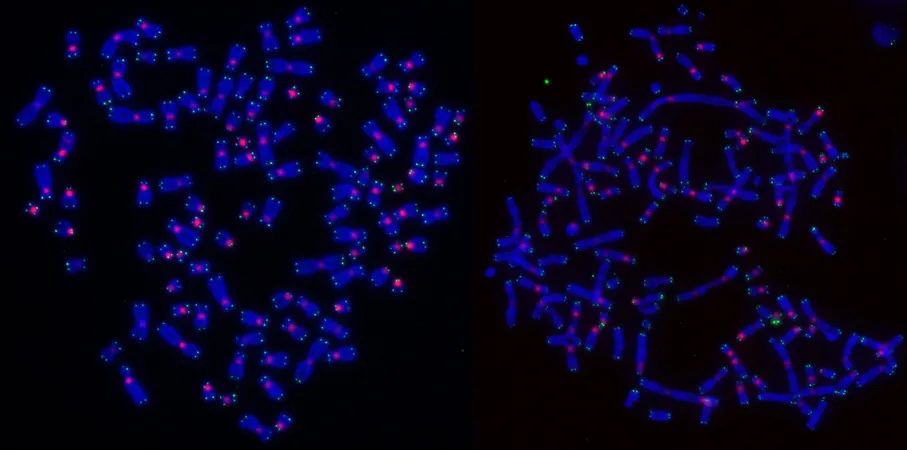
Revolutionary Discovery in Cancer Research: How DNA Repair Mechanisms Determine Tumor Cell Fate After Radiotherapy
2025-01-13
Author: Wei
Groundbreaking Discovery in Cancer Research
Researchers at Children's Medical Research Institute (CMRI) have made a groundbreaking discovery that sheds light on the enigmatic behavior of tumor cells following radiotherapy. Their recent findings, published in Nature Cell Biology, could mark a significant turning point in cancer treatment, potentially enhancing cure rates and leading to more effective therapies.
Understanding Diverse Responses to Radiotherapy
For decades, scientists have grappled with the question of why radiation therapy kills tumor cells in markedly different ways. This research, led by Dr. Radoslaw Szmyd and overseen by Professor Tony Cesare of CMRI’s Genome Integrity Unit, finally provides an answer. Understanding these divergent cell death pathways has profound implications for harnessing the immune system's power to combat cancer.
The Role of DNA Repair Mechanisms
Radiotherapy is a cornerstone of cancer treatment, but the variability in how tumor cells respond to radiation has remained largely unexplained. Some cell death methods go unnoticed by the immune system, while others are recognized, triggering a targeted immune response against remaining cancer cells. "Our research reveals a surprising connection between DNA repair processes and the mechanisms of cancer cell death post-radiation therapy," remarked Prof. Cesare.
Impact of Homologous Recombination on Tumor Cell Death
The study highlights that DNA repair, which usually safeguards healthy cells, plays a critical role in determining how cancer cells succumb to the damage inflicted by radiotherapy. "Typically, DNA within our cells sustains constant damage, necessitating ongoing repair. However, under extensive damage—such as that from radiation treatment—these repair mechanisms can signal tumor cells on how to die," explains Cesare.
Immune System Activation Through Altered Repair Pathways
Significantly, the research found that when cancer cells employed a repair method known as homologous recombination, they would perish during cell division, remaining undetected by the immune system—a situation physicians want to avoid. Conversely, cancer cells that managed radiation-induced DNA damage through alternative repair pathways released byproducts that mimicked a viral or bacterial presence, effectively ringing alarm bells to the immune system and catalyzing an immune response.
Clinical Implications of the Findings
By manipulating these pathways, the CMRI team demonstrated that inhibiting homologous recombination altered the death of cancer cells in such a way that triggered an immune reaction. Particularly concerning were cancer cells harboring mutations in the BRCA2 gene, critical for efficient homologous recombination, which do not die during mitosis after radiation exposure.
Future Directions in Cancer Treatment
This transformative findings open up exciting possibilities for clinical applications. The team suggests that combining radiotherapy with drugs that inhibit homologous recombination could help ensure that cancer cells activate the immune response, increasing the likelihood of effectively flagging the cancer for destruction by the body’s immune system.
A Paradigm Shift in Treatment Strategies
A/Prof Harriet Gee, a radiation oncologist involved in the research, emphasized the clinical significance of these results, particularly in enhancing the effectiveness of radiation therapy when used alongside immunotherapy. "For 30 years, the relationship between tumor cell death and DNA repair has puzzled clinicians. Our results could lead to a paradigm shift in treatment strategies," she stated.
Technological Advancements Supporting Research
This research effort owes much of its success to cutting-edge live cell microscopy technology, which allowed the team to monitor the complex behaviors of irradiated cells over an extended period, revealing the intricate processes at play.
Hope for the Future
As they continue to unravel the complexities of cancer treatment, CMRI researchers are hopeful that their findings will pave the way for new therapeutic advancements that ultimately improve outcomes for patients battling cancer. With each step forward, the potential to save lives becomes more tangible, offering hope to countless patients and their families.
Stay Tuned for Emerging Insights
Stay tuned as these emerging insights continue to unfold, promising a brighter future in the fight against cancer!

 Brasil (PT)
Brasil (PT)
 Canada (EN)
Canada (EN)
 Chile (ES)
Chile (ES)
 Česko (CS)
Česko (CS)
 대한민국 (KO)
대한민국 (KO)
 España (ES)
España (ES)
 France (FR)
France (FR)
 Hong Kong (EN)
Hong Kong (EN)
 Italia (IT)
Italia (IT)
 日本 (JA)
日本 (JA)
 Magyarország (HU)
Magyarország (HU)
 Norge (NO)
Norge (NO)
 Polska (PL)
Polska (PL)
 Schweiz (DE)
Schweiz (DE)
 Singapore (EN)
Singapore (EN)
 Sverige (SV)
Sverige (SV)
 Suomi (FI)
Suomi (FI)
 Türkiye (TR)
Türkiye (TR)
 الإمارات العربية المتحدة (AR)
الإمارات العربية المتحدة (AR)